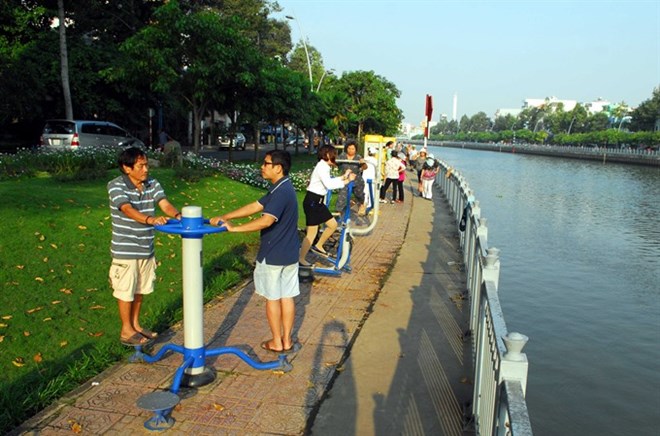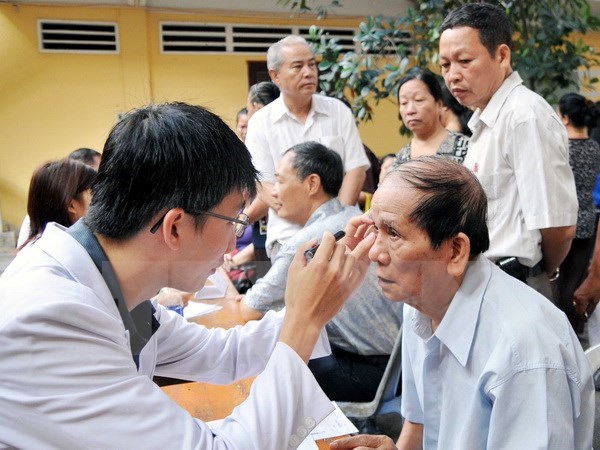Health care of older people a growing concern: Vietnam
Like many other countries in the region, Vietnam faces the question of how to care for its ageing citizens, most essentially when it comes to providing health care.
The issue was the focus of the workshop on “Health security of older persons: a survey of five ASEAN countries,” recently held by the Institute of Public Policy and Management (IPPM) at the National Economics University in Hanoi.
Researchers from Singapore, Malaysia, Thailand, Myanmar and Vietnam - together with a number of experts and representatives from agencies specialising population ageing issues in Vietnam - participated in the discussion.
 |
Older Vietnamese exercise on the side of the Nhieu Loc - Thi Nghe canal in HCM City. (Photo: VNA)
Assoc. Prof. Giang Thanh Long, IPPM Director, stressed the importance of developing health security programmes for Asian countries in general and the five countries surveyed in particular.
Even with considerable disparity between per-capita income among these countries, they all experience accelerated ageing. Therefore, studies and reviews on the effectiveness of policies will provide learning opportunities for all involved.
Delegates discussed how an ageing population leads to a rise in non-contagious but chronic diseases – such as cancer, diabetes, or cardiovascular diseases. These diseases require an overhaul of health care system, from facilities to personnel, further straining the already limited State budget.
Other aspects of elderly health care also need to be mainstreamed into State policy-making decisions: such as access to these healthcare services, and elderly satisfaction with health care.
Speaking at the workshop, Dr. Theresa Devasahayam, fellow and researcher-in-charge from Institute of Southeast Asian Studies in Singapore, said that the country’s government wants to push family values. Therefore, it has implemented a number of policies to encourage offspring and youngsters to take care of the elderly people – such as tax cuts and preferential housing prices for those living with their senior parents.
However, a noteworthy issue, as Dr. Theresa pointed out, is that the living cost in Singapore is exorbitant; it is one of the most expensive cities in the world. Therefore, ensuring an income that can comfortably cover expenses, including healthcare for low-income or irregular income earners, needs to be taken into account.
Assoc. Prof. Ling How Kee from the Social Science Faculty of Malaysia’s Unimas University said that the country also holds family values in high regards. It’s often the case that old parents wish to live under the same roof with their children and grandchildren.
However, the elderly are feeling the profound impact of increasing migration from rural areas to urban centres.
Thailand, despite its trend of fewer children are living with their parents, still places a high premium on family relationships, thanks in large part to frequent communications, Assoc. Prof. Rossarin Gray, who is serving as Deputy Director of the Institute for Population and Social Research at Mahidol University, said.
Giving a low-income country perspective, Malaysian Prof. Hein Thet Ssoe, from HelpAge International – an international NGO that offers support for the elderly – said the country’s government is encouraging children to live with their parents.
However, like other Asian countries, stark and ever-expanding generational differences have led to a mounting preference for adult children to move away from their parents, causing a drop in number of the traditional multigenerational family. In Myanmar, nonagenarians and older are given a monthly subsidy, in addition to free-of-charge health check-ups and treatment, he added.
Vietnam can learn from best practices implemented by other countries to deal with ageing populations. For example, the measures Thailand has taken to extend health care coverage to all people, or the shift towards a community-based geriatrics health care scheme.
Policies that provide financial support in housing purchases for adult children, who want to live with their parents, if done right, can sway the trend of nuclearisation of households.
 |
Better health care service for the elderly by developing a standardised caring system in health facilities and in the community, especially for those in rural and mountainous areas. (Illustrative image. Source: VNA)
Considering the ageing Vietnamese population, the speakers all recommended the Vietnamese Government not only to pay attention to health care for old people as a standalone part in the health care system, but also consider a total overhaul of social security and health insurance. Its end goal should be a ‘successfully ageing society’ – where older people are able to achieve financial security, health care insurance, and active engagement in social activities.
The Government should reorient the delivery system from the intensive use of hospital care to greater reliance on improved primary care and reform provider payment mechanisms from fee-for-services to case-based approaches, recommended Phillip O’Keefe, World Bank’s Regional Lead Economist for Human Development for the East Asia and Pacific Region.
In closing, he said that adopting good practices and learning from similar countries’ social and cultural experience will always yield numerous benefits.
According to the Vietnam National Committee for Elderly’s data in late 2016, Vietnam has over 10 million senior people, who account for nearly 11 per cent of the population, 18.6 per cent of whom are 80 and above./.
VNF/VNA
Recommended
 Handbook
Handbook
Vietnam Moves Up 8 Places In World Happiness Index
 Handbook
Handbook
Travelling Vietnam Through French Artist's Children Book
 Multimedia
Multimedia
Vietnamese Turmeric Fish among Best Asian Dishes: TasteAtlas
 Handbook
Handbook
From Lost to Found: German Tourist Thanks Vietnamese Police for Returning His Bag
 Handbook
Handbook
Prediction and Resolution for the Disasters of Humanity
 Handbook
Handbook
16 French Films To Be Shown For Free During Tet Holiday In Vietnam
 Handbook
Handbook
Unique Cultural and Religious Activities to Welcome Year of the Snake
 Handbook
Handbook
